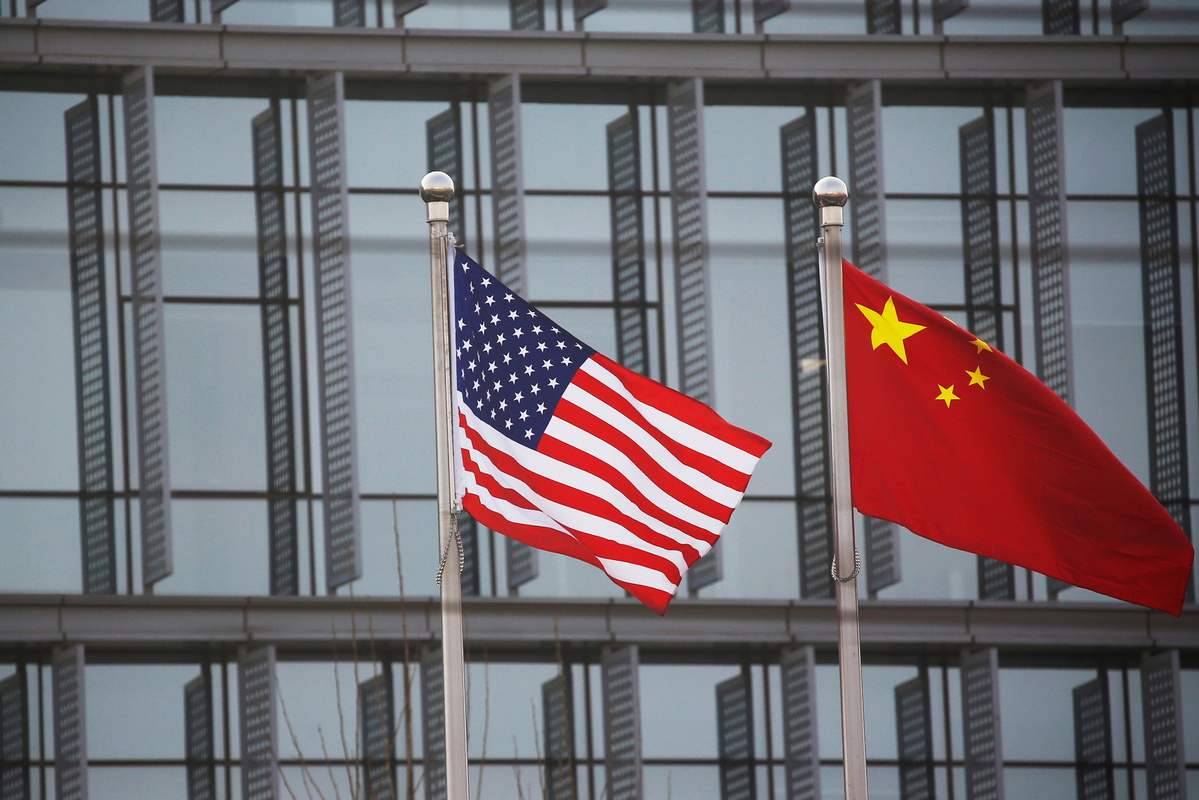
Chinese and US flags flutter outside the building of an American company in Beijing. [Photo/Agencies]
China assumed on Monday the rotating presidency of the United Nations Security Council for February in a "turbulent period", as its top envoy to the UN said that "there is no winner in a trade war".
China is "firmly opposed to" additional tariffs imposed by the United States, and "we do believe that this is in violation of WTO rules," said Fu Cong, China's permanent representative to the UN.
"Let me also emphasize that there is no winner in a trade war. We do hope that the US will look at its own problems and find a solution that is beneficial not only to itself but also to the whole world," Fu told reporters during a news briefing marking the start of China's Security Council presidency. "Frankly speaking, I don't think that raising tariffs is beneficial to the US itself."
The US has levied a 10-percent tariff on Chinese imports amid claims about fentanyl.
"China is one of the countries with the most stringent regulations on fentanyl. In fact, we have regulations on all fentanyl-related substances. China is the only country that puts the entire category of fentanyl-related substances under regulation," said Fu.
On May 1, 2019, China officially added all fentanyl-related substances to its list of controlled chemicals, which far exceeds the scope of 27 fentanyl-related substances under control under the UN's drug conventions.
"The US should approach it more from its own perspective. For instance, it should look at the demand side of fentanyl rather than shifting the blame onto others," said Fu. He added that the recent US accusations against China with regard to the Panama Canal are "totally false".
US Secretary of State Marco Rubio had told Panama's President Jose Raul Mulino on Sunday that Panama needs to "immediately take steps" to end "China's influence and control" over the Panama Canal.
Fu said that "China has not participated in the management or operation of the Panama Canal and has never interfered in canal affairs. China respects the sovereignty of the canal and recognizes the canal as a permanently neutral international gateway."
Meanwhile, Panama announced on Sunday that it will not renew its participation in the Belt and Road Initiative.
"I think that is a regrettable decision because the Belt and Road Initiative, first and foremost, is an economic initiative," said Fu.
"The purpose is to build a platform for countries, especially those in the Global South, to engage in economic cooperation with each other. It has nothing to do with any political agenda, and the economic cooperation is mutually beneficial. We do hope that countries will see this initiative in the proper light," he added.
"The smear campaign launched by the US and some other Western countries against the Belt and Road Initiative is totally groundless," said the ambassador. "We will continue our efforts in the hope that the Global South can achieve better development and that China can provide assistance to all these developing countries."
Regarding the topic of artificial intelligence, particularly the recent rise of Chinese AI startup DeepSeek, Fu said that "technological containment and technological restrictions do not work".
"Never, ever underestimate the ingenuity of Chinese scientists and engineers," he said. "What we need is not more bans, more restrictions, or more closures. Look at Huawei, look at TikTok, now DeepSeek — how many more do you want to ban?"
He called for opening-up and promoting cooperation both on the technological level and on the political level between the US and China.
"China and the US, being the two most advanced countries in terms of AI, have so much to cooperate on. As we always say, AI has profound ramifications in all aspects of human life," Fu said.
"In my view, we cannot afford not to cooperate. We need to cooperate to ensure that the benefits of AI are available to all countries, particularly in the Global South," he said.
He called for cooperation on artificial intelligence between China and the US to establish proper guardrails as AI develops.
"If we have fragmentation, it will only enhance the risks and reduce the benefits. I don't think that is in anyone's interest, including the United States, and certainly not in the interest of the whole world," he said.
Fu said he believes that "China and the US, as the two biggest countries in the world, have so much in common and many areas where we can cooperate."
Within the framework of the UN, there are global issues that require the concerted efforts of the entire international community, particularly countries like China and the US, said Fu. These include anti-terrorism efforts, narcotics control, nonproliferation and climate change.
"I do hope that despite all the rhetoric we've heard from American politicians, we can take a constructive — and I will emphasize — a professional approach to our work here in the United Nations. There are so many issues we can address together, and so much is at stake," he said.
Fu also announced that a high-level open debate, scheduled for Feb 18, will be chaired by Chinese Foreign Minister Wang Yi.
minluzhang@chinadailyusa.com